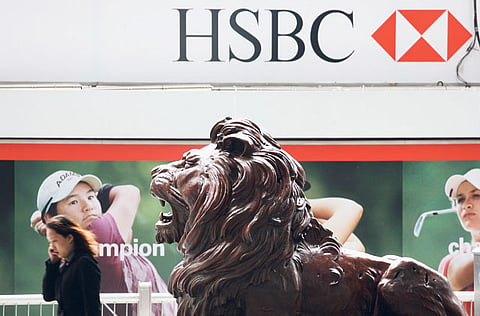Big changes as HSBC looks east
Push into emerging markets to remain in place if ceo resigns after shake-up

Hong Kong: HSBC Holdings Plc's push into emerging markets is expected to remain in place, with its strong focus on Greater China, after reports that its newly relocated CEO would step down following a management shake-up.
Chief Executive Michael Geoghegan will be replaced by the head of its global banking division Stuart Gulliver, a source said, with the Financial Times reporting that he is expected to leave by the end of the year.
"The overall broad strategy is going to remain constant," said Dominic Chan, an analyst at BNP Paribas. "The Nedbank purchase and everything they've said recently all says they're not going to suddenly change direction and decide they want to be an investment bank."
Reshuffle
Talk of a management reshuffle pushed Hong Kong-listed shares of HSBC down about 0.5 per cent during the midday break, lagging a 0.3 per cent advance on the benchmark Hang Seng Index.
Geoghegan had threatened to quit if he was not made chairman, the Financial Times had reported earlier, following Stephen Green's departure for a ministerial position in the British government.
HSBC usually promoted its chief executive to the non-executive chairman's position, but Finance Director Douglas Flint had emerged as a leading candidate for the job after Green left, a person familiar with the matter said on Thursday.
"It's an unusual move, but with banking becoming an increasingly regulated sector, Flint is actually a good choice," Daniel Tabbush, an analyst at CLSA in Bangkok, said. "He's a conservative player who knows the business well, has a clear understanding of accounting systems in various countries, as well as how profitable each country is, so he's going to represent some continuity."
Independence
Chairman and CEO roles, which were often combined in previous generations, are being split to enhance corporate governance after the financial crisis revealed the need for independence at the top structures of financial institutions.
Geoghegan has been most closely identified with the push by Europe's biggest bank into Asia and other emerging markets, having himself relocated to the firm's Norman Foster-designed headquarters in Hong Kong from London.
This extends to HSBC's push to be listed on Shanghai's international board even though the bank claims it does not need funds, and has been identified with the purchase of South Africa's Nedbank.
It was not clear if Gulliver would move to Hong Kong from London.
Weak segment
The expected appointment of investment banking head Gulliver to replace Geoghegan has thus raised questions if this could signal that the bank's board hopes to ramp up its investment banking business, a segment where it has traditionally been weak.
This would make Gulliver the second investment banking chief to be named chief executive of a top British bank this month, following Bob Diamond's appointment as CEO of Barclays Plc.
However, analysts dismissed such talk, pointing to Gulliver's 30 years and Flint's 15 spent at the bank.
"The leading candidates are still internal ones that the market knows well, so it's unlikely there would be dramatic strategic change," said Sunil Garg, an analyst at JP Morgan.
"This could be taken positively by those looking for stability or negatively for those who believe that the group has not capitalised sufficiently on its financial strength through the crisis."



